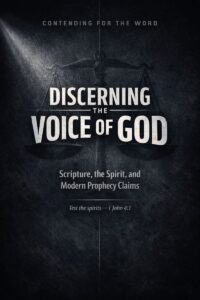⏱️ Estimated Reading Time: 5 min read
The Biblical Case for Church Membership
In recent years, the belief that professing Christians should gather regularly as members of a local church has declined in many corners of evangelicalism. Some argue that faith should remain a private matter—something deeply personal, not bound to what they view as “institutional religion.” Others, having been wounded by poor experiences in unhealthy churches, now view all church structures with suspicion or distance themselves entirely from organized fellowship.
But Scripture presents a radically different view. Biblical Christianity is not merely about a personal relationship with Jesus. It is about being part of His blood-bought family. Church membership is not man’s invention. It is God’s gracious design for the protection, growth, and witness of His people.
Church Membership: Implied and Practiced in Scripture
It’s true that the Bible doesn’t use the modern phrase “church membership.” But just as the word Trinity doesn’t appear in Scripture, the concept is thoroughly biblical. The New Testament gives a clear and compelling picture of defined, accountable belonging within a local body of believers.
1. God Distinguishes His People from the World
From the Old Testament forward, God marks out His people from the world. In Leviticus 13:46, Numbers 5:3, and Deuteronomy 7:3, God establishes boundaries that separate Israel from surrounding nations. This theme continues into the New Testament. Christians are described as a holy people, set apart to display God’s glory in a dark world (1 Peter 2:9). In practice, this distinction becomes visible through belonging to a local church that is ordered under God’s Word.
2. The Early Church Counted Its Members
After Peter’s sermon at Pentecost, Acts 2:41 records that “about three thousand souls were added.” Verse 47 tells us “the Lord added to their number day by day those who were being saved.” The early church didn’t merely gather in a vague or undefined sense. They knew who belonged, and new believers were visibly added to their number.
3. The Local Church Is the Context for Obedience and Discipline
In Matthew 16:18–19 and Matthew 18:17–19, Jesus gives His disciples authority to bind and loose within the context of the local church. Paul echoes this in 1 Corinthians 5:12–13, where he speaks of removing someone “from among you.” In 2 Corinthians 2:6, he refers to a punishment inflicted “by the majority.” These instructions only make sense in a community with clear boundaries—where it is known who is in and who is not.
The dozens of “one another” commands in the New Testament also confirm this. Christians are commanded to love one another, bear one another’s burdens, forgive one another, serve one another, and more. These commands assume regular, committed life together in a defined local body.
4. The Epistles Were Written to Local Churches
Paul and the other apostles wrote to specific churches, not to floating gatherings of uncommitted individuals. Consider the following greetings:
- 1 Corinthians 1:2 — “To the church of God that is in Corinth”
- 2 Corinthians 1:1 — “To the church of God that is at Corinth, with all the saints”
- Philippians 1:1 — “To all the saints in Christ Jesus who are at Philippi, with the overseers and deacons”
- Galatians 1:2 — “To the churches of Galatia”
- 1 Thessalonians 1:1 — “To the church of the Thessalonians in God the Father and the Lord Jesus Christ”
These letters assume the recipients are members of local congregations with pastors, deacons, and defined relationships under the authority of Christ.
5. Pastors Are Responsible for Particular People
Hebrews 13:17 instructs believers to obey their leaders and submit to them, “for they are keeping watch over your souls, as those who will have to give an account.” Pastors are not accountable for everyone who visits on a Sunday. They are called to shepherd specific people who have placed themselves under their care. Church membership makes that visible and formal.
6. Christians Are Saved Into Community
Christ does not save sinners to remain in isolation. He saves them into a people. Acts 2:42–47 shows the early believers devoting themselves to the apostles’ teaching, fellowship, the breaking of bread, and prayer. While some cite this passage to argue for house churches or informal gatherings, it’s important to note that as the church grew, they gathered both in homes and in larger public settings. The form may vary, but the function remains: Christians gather, worship, grow, and go together.
Whether a church meets in a building or a living room, the people of God are called to assemble to worship in spirit and truth, hear the preached Word, receive the ordinances, fellowship, and scatter with the gospel.
Objections to Church Membership
Some object that they’ve been hurt by churches and no longer trust the institution. That pain is valid. But the answer is not withdrawal from God’s people. Instead, it is finding a faithful, Bible-preaching church that values truth and cares well for its members.
Others believe that attending without commitment is enough. But the New Testament never presents faith as a private walk detached from the body. Christianity is always personal, but never individualistic.
Still others claim that the church is full of hypocrites. That’s true in one sense. The church is made up of sinners who are being sanctified. It is both spotless because of Christ’s righteousness and still in progress as we grow in holiness. To reject the church because of imperfect people is to reject what Christ purchased with His own blood.
Conclusion
Church membership is not a cultural add-on or an optional tradition. It is a biblical and theological necessity. Through membership, believers publicly identify with Christ, come under the care of shepherds, serve others with their gifts, and grow in Christlikeness together.
The local church is where Christians learn, love, repent, are held accountable, and are sent out on mission. It is the visible expression of God’s kingdom on earth. Christians are not meant to live as spiritual lone rangers. Christ calls us into community for our good and His glory.
Recommended Resources
Dave Jenkins is happily married to his wife, Sarah. He is a writer, editor, and speaker living in beautiful Southern Oregon. Dave is a lover of Christ, His people, the Church, and sound theology. He serves as the Executive Director of Servants of Grace Ministries, the Executive Editor of Theology for Life Magazine, the Host and Producer of Equipping You in Grace Podcast, and is a contributor to and producer of Contending for the Word. He is the author of The Word Explored: The Problem of Biblical Illiteracy and What To Do About It (House to House, 2021), The Word Matters: Defending Biblical Authority Against the Spirit of the Age (G3 Press, 2022), and Contentment: The Journey of a Lifetime (Theology for Life, 2024). You can find him on Facebook, Twitter, Instagram, Youtube, or read his newsletter. Dave loves to spend time with his wife, going to movies, eating at a nice restaurant, or going out for a round of golf with a good friend. He is also a voracious reader, in particular of Reformed theology, and the Puritans. You will often find him when he’s not busy with ministry reading a pile of the latest books from a wide variety of Christian publishers. Dave received his M.A.R. and M.Div through Liberty Baptist Theological Seminary.




